Related Research Articles
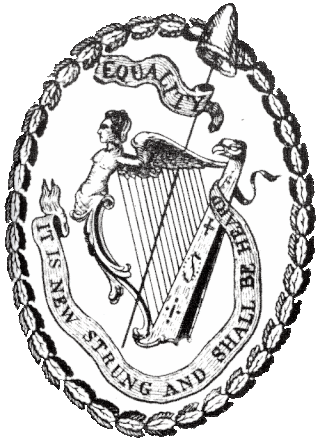
The Society of United Irishmen was a sworn association in the Kingdom of Ireland formed in the wake of the French Revolution to secure "an equal representation of all the people" in a national government. Despairing of constitutional reform, and in defiance both of British Crown forces and of Irish sectarian division, in 1798 the United Irishmen instigated a republican rebellion. Their suppression was a prelude to the abolition of the Irish Parliament in Dublin and to Ireland's incorporation in a United Kingdom with Great Britain. An attempt, following the Acts of Union, to revive the movement and renew the insurrection led to an abortive rising in Dublin in 1803.

The Irish Rebellion of 1798 was a popular insurrection against the British Crown in what was then the separate, but subordinate, Kingdom of Ireland. The main organising force was the Society of United Irishmen. First formed in Belfast by Presbyterians opposed to the landed Anglican establishment, the Society, despairing of reform, sought to secure a republic through a revolutionary union with the country's Catholic majority. The grievances of a rack-rented tenantry drove recruitment.

Henry Joy McCracken was an Irish republican, a leading member of the Society of the United Irishmen and a commander of their forces in the field in the Rebellion of 1798. In pursuit of an independent and democratic Irish republic, he sought to ally the disaffected Presbyterians organised in the Society with the Catholic Defenders, and in 1798 to lead their combined forces in Antrim against the British Crown. Following the defeat and dispersal of the rebels under his command, McCracken was court-martialled and executed in Belfast.
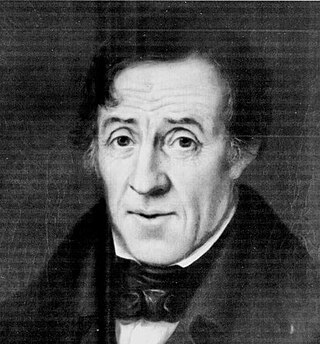
James "Jemmy" Hope was a radical democrat in Ireland who organised among tenant farmers, tradesmen and labourers for the Society of the United Irishmen. In the Rebellion of 1798 he fought alongside Henry Joy McCracken at the Battle of Antrim. In 1803 he attempted to renew the insurrection against the British Crown in an uprising coordinated by Robert Emmett and the new republican directorate in Dublin. Among United Irishmen, Hope was distinguished by his conviction that "the fundamental question at issue between the rulers and the people" was "the condition of the labouring class".
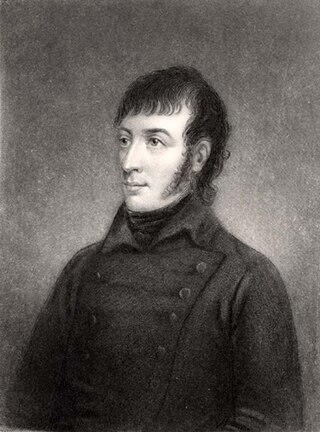
Thomas Paliser Russell was a founding member, and leading organiser, of the United Irishmen marked by his radical-democratic and millenarian convictions. A member of the movement's northern executive in Belfast, and a key figure in promoting a republican alliance with the agrarian Catholic Defenders, he was arrested in advance of the risings of 1798 and held until 1802. He was executed in 1803, following Robert Emmet's aborted rising in Dublin for which he had tried, but failed, to raise support among United and Defender veterans in the north.

Mary Ann McCracken was a social activist and campaigner in Belfast, Ireland, whose extensive correspondence is cited as an important chronicle of her times. Born to a prominent liberal Presbyterian family, she combined entrepreneurship in Belfast's growing textile industry with support for the democratic programme of the United Irishmen; advocacy for women; the organising of relief and education for the poor; and, in a town that was heavily engaged in trans-Atlantic trade, a lifelong commitment to the abolition of slavery. In 2021, Belfast City Council agreed to erect a statue of Mary Ann McCracken in the grounds of Belfast City Hall.

The Belfast Charitable Society, founded in 1752, is Belfast's oldest charitable organisation. It continues its philanthropic work from Clifton House which the Society opened, originally as the town's poor house and infirmary, in 1774.
Clifton Street Cemetery, Belfast, holds the graves of a number of Belfast's most distinguished figures. The cemetery, whose entrance is at Henry Place in Belfast, is cared for by Belfast City Council and can only be accessed by prior arrangement with council officials. The cemetery contains the graves of members of the United Irishmen and social reformers as well as industrialists. There are also approximately 8,000 people buried in the cemetery's poor ground.
Robert Simms was an Irish radical, and a founding member in Belfast of the Society of United Irishmen.
Reverend William Sinclair was an Irish Presbyterian minister and, as a radical democrat, a member of the Society of United Irishmen. Forced after the rebellion of 1798 into American exile, he became a leading figure in the Irish immigrant community in Baltimore.
Henry Haslett was in 1791 a founding member in Belfast of the democratic-revolutionary Society of the United Irishmen, and one of the twelve original proprietors of its Painite newspaper, the Northern Star. He had been representative of a group of merchants in the city who had chafed at the Navigation Acts and other measures enacted under the British Crown that restricted Irish trade and industry. He was released from fourteen months detention just before the Irish Rebellion of 1798 in which he played no role. After the 1800 Acts of Union incorporating Ireland in a United Kingdom with Great Britain, he was again active in the commercial life of Belfast promoting its growth as a port.
Gilbert McIlveen was a Belfast linen draper and founding member of the Society of the United Irishmen, a revolutionary organisation in late 18th century Ireland. He took no part in the rebellion of 1798 and in 1803, in response to rumours of a further republican insurrection, he joined the loyalist yeomanry.
Samuel McTier was the first president of the Belfast Society of the United Irishmen, a revolutionary organisation in late 18th-century Ireland.
James Dickey was a young barrister from a Presbyterian family in Crumlin in the north of Ireland who was active in the Society of the United Irishmen and was hanged with Henry Joy McCracken for leading rebels at the Battle of Antrim.
William Tennant (1759–1832), often spelt William Tennent, was an Ulster Presbyterian banker and a leading member in Belfast of the Society of the United Irishmen who, in 1798, sought by insurrection to secure a representative and independent government for Ireland. After a period of imprisonment, he returned to the commercial and civic of Belfast, in 1810 helping to found what is today the Royal Belfast Academical Institution.

Captain Waddell Cunningham was an Irish merchant, prominent in the commercial and civic life of Georgian-era Belfast. As a patron of the Belfast Charitable Society and its Poor House; as a commander of the Volunteer patriot militia; and as a Presbyterian subscriber to the costs of erecting Belfast's first Catholic chapel, in a town much agitated by the American struggle for independence he was seen a friend of reform. But as a land speculator, a slaveholder in the West Indies, and an opponent of immediate Catholic Emancipation, he was at odds with the more democratic elements of the town and surrounding districts who, in the wake of the French Revolution, were to directly challenge the authority of the British Crown and of the landed Protestant Ascendancy
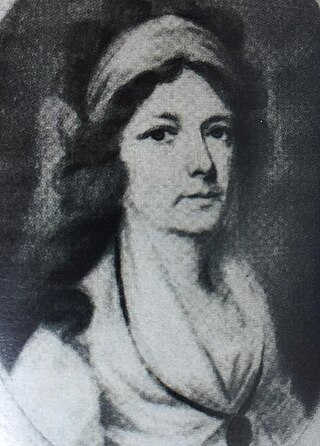
Martha "Matty" McTier was an advocate for women's health and education, and a supporter of democratic reform, whose correspondence with her brother William Drennan and other leading United Irishmen documents the political radicalism and tumult of late eighteenth-century Ireland.
William Putnam McCabe (1776–1821) was an emissary and organiser in Ireland for the insurrectionary Society of United Irishmen. Facing multiple indictments for treason as a result of his role in fomenting the 1798 rebellion, he effected a number of daring escapes but was ultimately forced by his government pursuers into exile in France. With the favour of Napoleon, he established a cotton factory at Rouen while remaining active as a member of a new United Irish Directory. He worked to assist Robert Emmett in coordinating a new rising in Ireland in 1803, and later had contact with the Spencean circle in London implicated in both the Spa Field riots and the Cato Street Conspiracy.

James MacDonnell was an Irish physician and polymath who was an active and liberal figure in the civic and political life of Belfast. He was a founding patron of institutions that have since developed as the Royal Victoria Hospital, the Royal Belfast Academical Institution and the Linen Hall Library and, beginning with the organisation of the Belfast Harpers Assembly in 1792, was a promoter of efforts to preserve and revive Irish music and the Irish language. Among some of his contemporaries his reputation suffered in 1803 as a result of his making a subscription for the arrest of his friend, the outlawed United Irishman Thomas Russell.
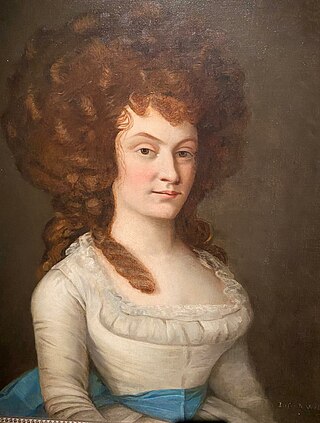
Cherry Crawford Hyndman (1768-1845) was the mistress of a liberal political household in Belfast, Ireland, and reputedly in the 1790s an active member of the republican Society of United Irishmen.
References
- Marianne Elliott 2012, Wolfe Tone Second edition, Liverpool University Press
- John McCabe 1999, A United Irish Family: The McCabes of Belfast (Part III), 'North Irish Roots' Vol. 10, No. 1 (1999), pp. 33–35
- Northern Ireland.org, Hidden Connections: The Abolitionist Movement in Ireland, (http://www.culturenorthernireland.org/article/103/hidden-connections-the-abolitionist-movement-in-ireland)
- Kenneth L. Dawson 2003, Moment of unity - Irish rebels and Freemasons, 'Irish News', May 10, 2003
- Raymond O'Regan & Arthur Magee 2014, 'The Little Book of Belfast', The History Press
- Raymond O'Regan 2004, The history of Belfast's Exchange & Assembly Rooms, 'Your Place & Mine', June 2004.
- Kenneth Leslie Dawson 2004, McCabe, William Putnam (c. 1776-1821), Irish nationalist and cotton manufacturer, Oxford Dictionary of National Biography